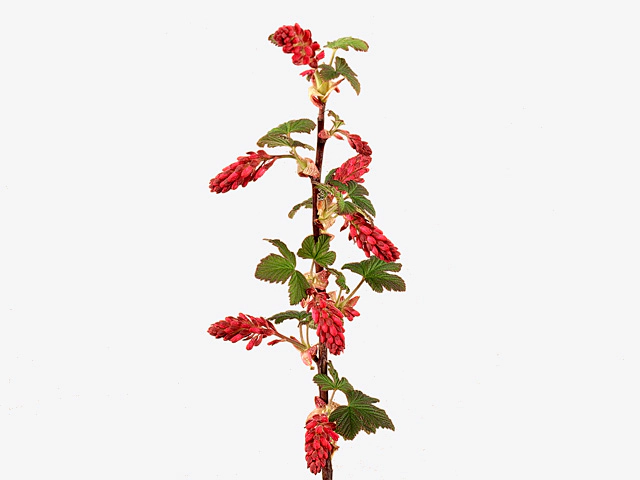Ribes sanguineum 'King Edward VII'

| Leaf tip | Pointed/acute |
| Flower type | Single |
| Leaf margin | Digitately lobed; Serrate; Serrate |
| Flower scent | Normal; Strong |
| Winter hardness | Good (USDA-zone 5, 6) |
| Flower color | Red-medium brown purple-186A |
| Leaf, general shape | Cordate (heart-shaped); Circular |
| Flower diameter | 1 - 10 mm |
| Inflorescence | Raceme; Raceme |
| Flowering month(s) | March; April |
| Leaf duration | Deciduous |
| Leaf size | 2 - 3 cm |
| Light conditions | Sunny |
| Plant, growth type | Erect |
| Leaf, main color | Light green |
| Flower color distribution | Unicolored |
| Leaf, secondary color(s) | Red |
| Toxicity (if consumed) | Not or barely |
| Moisture requirements | Well-drained; Moist |
Ribes sanguineum 'King Edward VII', also known as Winter Currant, is a beautiful and resilient plant that adds a burst of color to any garden. This particular variety is highly recommended for zones 5 and 6, as it can withstand cold winter temperatures with ease.
One of the standout features of Ribes sanguineum 'King Edward VII' is its striking flower color. The petals are a mesmerizing shade of red-medium brown purple, which adds a touch of elegance to the landscape. The flowers themselves are single and have a delightful scent, ranging from normal to strong.
The leaves of this winter currant are another notable feature. They are heart-shaped, with a pointed or acute tip, giving them a unique appearance. The leaf margin is digitately lobed and serrated, lending an interesting texture to the foliage. The main color of the leaves is light green, with secondary hues of red, creating a captivating contrast.
When it comes to growth habit, Ribes sanguineum 'King Edward VII' is an erect plant. It reaches a height of about 2-3 feet, making it a great addition to borders or as a standalone feature. It thrives in sunny conditions and prefers well-drained, moist soil. As for moisture requirements, it is important to ensure the plant receives adequate water, but waterlogging should be avoided.
The flowers of this winter currant bloom in the months of March and April, transforming the garden into a vibrant display of colors. The inflorescence is in the form of racemes, adding a graceful appeal to the overall look. The flower diameter ranges from 1-10 mm, providing a delicate touch to the landscape.
One of the advantages of Ribes sanguineum 'King Edward VII' is its deciduous nature. The leaves fall during the winter months, allowing for a change in the garden's appearance. However, this currant is not toxic if consumed, making it a safe choice for households with children or pets.
In conclusion, Ribes sanguineum 'King Edward VII' is a standout winter currant that adds beauty and charm to any garden. Its vibrant red-medium brown purple flowers, heart-shaped leaves, and erect growth habit make it a highly desirable plant. With good winter hardiness and a preference for sunny, well-drained soil, this currant thrives in zones 5 and 6. Whether planted in borders or as a standalone specimen, this winter currant is sure to enhance the beauty of any outdoor space.
Market availability index by month:
| Jan. | Feb. | Mar. | Apr. | May | Jun. | Jul. | Aug. | Sep. | Oct. | Nov. | Dec. |
|---|---|---|---|---|---|---|---|---|---|---|---|
| 1 | 1 | 4 | 3 | 1 | 1 | 1 | - | - | - | - | - |